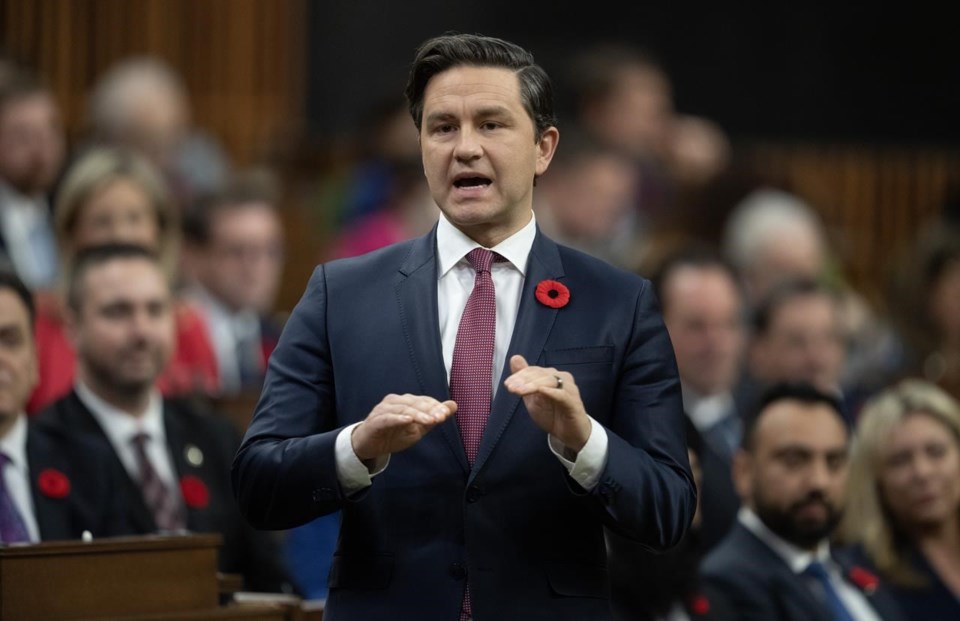REGINA — Conservative Leader Pierre Poilievre made his pitch to Saskatchewan conservatives on Saturday, pledging better relations with Western Canada should he become the next prime minister.
Poilievre, speaking at the Saskatchewan Party convention in Regina, praised Premier Scott Moe and his government for fighting Ottawa's carbon pricing program and called on Prime Minister Justin Trudeau to scrap it.
"When I am prime minister, the era of Ottawa telling Western Canada to pay up and shut up will be over once and for all," he said.
Poilievre took a shot at Gudie Hutchings, the federal rural economic development minister, who told CTV last week that people in Western and Prairie provinces should elect more Liberals if they want to have conversations around potential exemptions to the tax.
Trudeau announced last week that the tax would be exempt for three years on home heating oil to address affordability needs. The move is seen to largely help those in Atlantic provinces, where it's a main source of home heating.
But Poilievre and premiers across the country have said the tax exemption is unfair to the rest of Canada.
Moe has said provincial natural gas utility SaskEnergy won't remit the carbon tax to Ottawa starting Jan. 1 unless the federal government offers an exemption. The move would break federal law.
"We know that the solution is if you don't want a carbon tax, it is not to elect more Liberals, it is to elect more common-sense Conservatives," Poilievre said Saturday.
Poilievre also repeated his pledge to repeal the federal Impact Assessment Act and replace it with a law that aims to get energy projects built faster, and that also consults First Nations communities and protects the environment.
He further said he would like nuclear power plants built faster. Saskatchewan has ample uranium supplies and is looking to build small modular nuclear reactors as part of its future power grid.
"We're going to fight climate change exactly the opposite way that Justin Trudeau does," he said. "He believes in making traditional energy we still need more expensive. I believe in making alternatives more abundant and more affordable, and we have those alternatives right here in Saskatchewan."
Moe and his counterparts in Alberta have long taken issue with the federal bill, and his government passed in the spring the Saskatchewan First Act, which allows the province to study federal environmental policies that it believes harm Saskatchewan's economy.
But with a Poilievre government, Moe said using the legislation likely wouldn't be necessary.
"I think you would see a much more collaborative working relationship where we would work together to actually attract that investment and provide that opportunity," Moe told reporters.
"Despite what some may think, I don't wake up every morning and think of a new way (of) how can I not get along with the federal government."
The Supreme Court of Canada ruled against the federal legislation, finding it unconstitutional because it can be seen to regulate activities within provincial jurisdiction.
Federal Environment Minister Steven Guilbeault has said the court's opinion doesn't strike down the law and won't change how federal assessments have been conducted.
Moe received 97 per cent support from delegates following his leadership review at the convention.
Saskatchewan is expected to have an election next year.
The premier, who addressed delegates immediately after Poilievre, asked who they trusted on important issues. He included his government's pronoun legislation, which requires parental consent for kids under 16 to change their names or pronouns at school.
In an August byelection, the conservative Saskatchewan United Party, which says it champions parental rights, received 23 per cent of the vote, appearing to take a bite out of the Saskatchewan Party's base. The Saskatchewan Party won the byelection with 54 per cent of ballots cast.
Moe warned conservatives need to be united as the election approaches to prevent the NDP from regaining power.
"Who do you trust to protect the education system -- the education of Saskatchewan children? The NDP, who think they know better than parents? They trust the courts and the state more than they trust parents, or the Saskatchewan Party who understand that parents are parents," Moe said.
This report by The Canadian Press was first published Nov. 4, 2023.
Jeremy Simes, The Canadian Press



